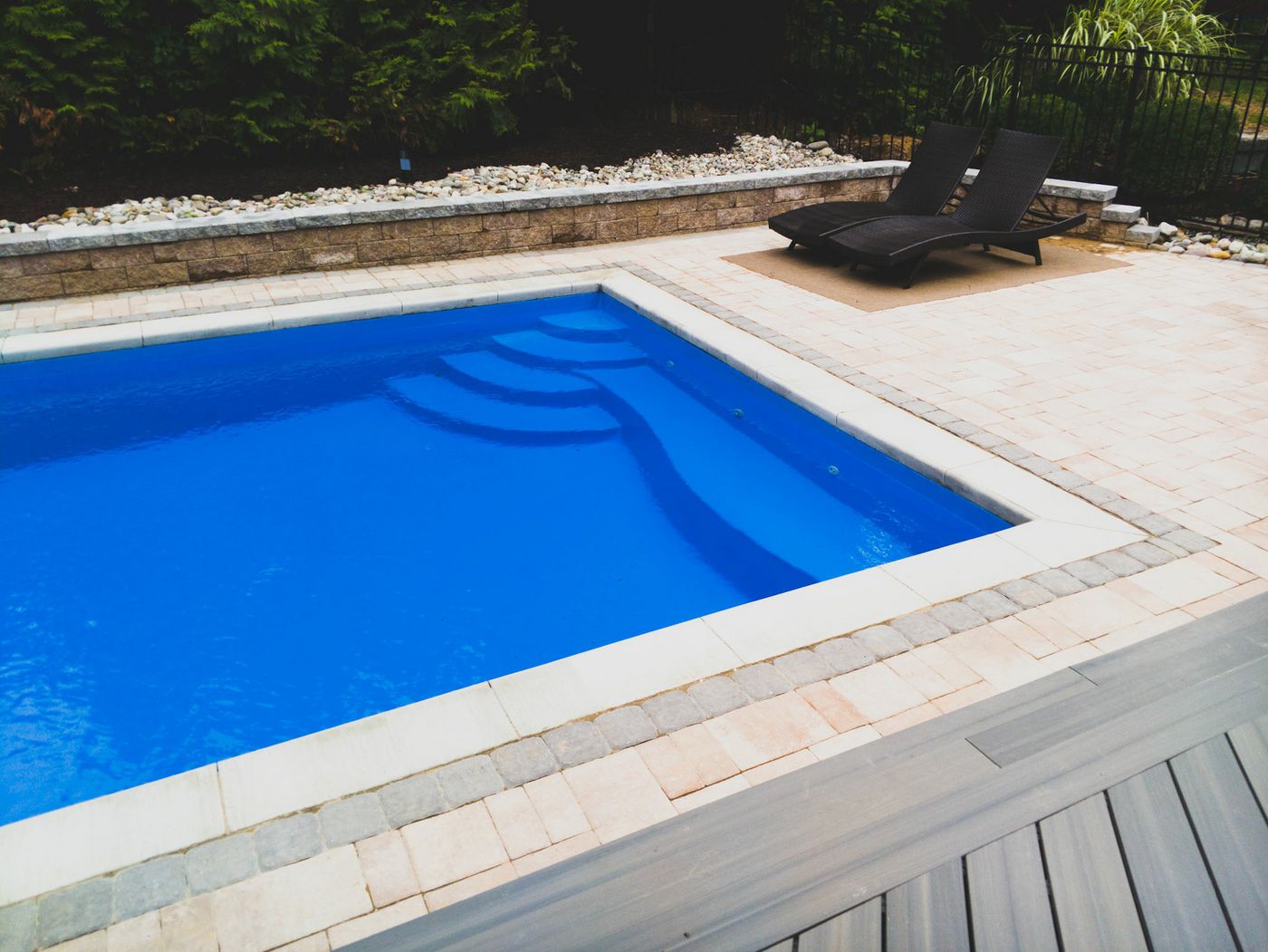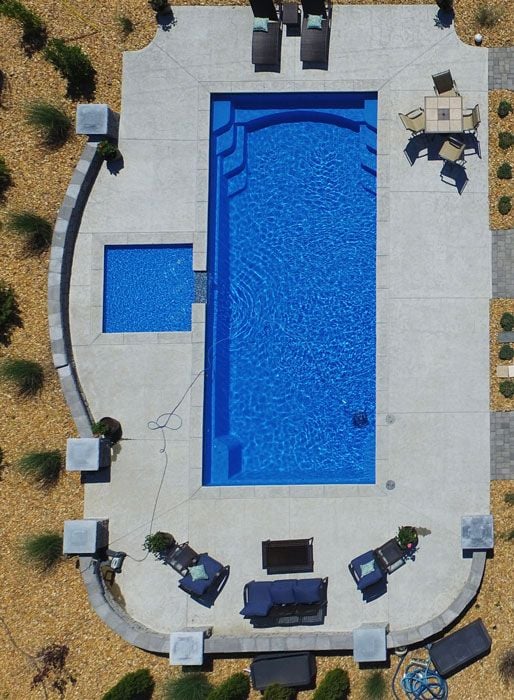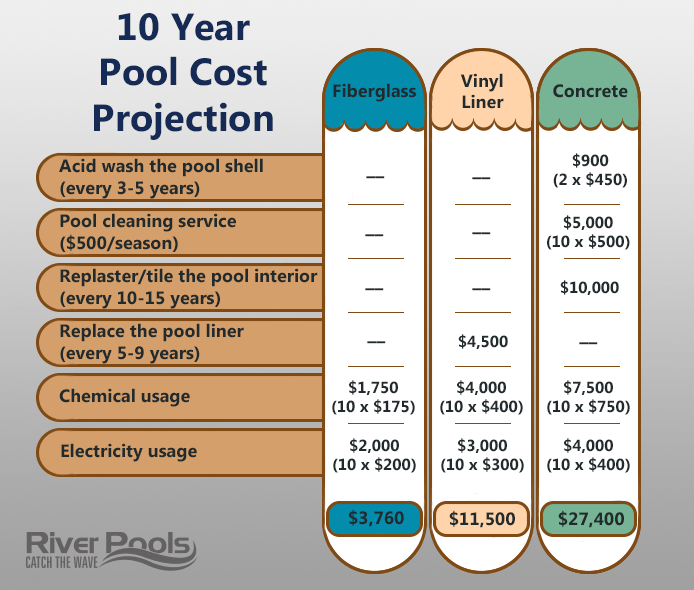
Will My Inground Pool Fade?
Fiberglass vs Concrete vs Vinyl Liner | Pool Maintenance
If you're considering an inground pool, you're probably wondering what the pool will look like in 5, 10, or even 20 years.
At River Pools, we've been around a while and understand how the different types of inground pools weather over time…specifically, when and how the surfaces of inground pools fade.
Here's the bottom line: Every pool will eventually fade to some degree (so long as it's not already white). This goes for concrete, vinyl liner, and even fiberglass pools.
Think about it. If we sat outside, submerged in water and exposed to the elements 24/7 all year long, we'd show a little sign of wear too!
At River Pools, we specialize in fiberglass pools. But regardless of the type of pool, consider these three main questions with regards to the fading pool surfaces:
- How quickly will my pool fade?
- How evenly will my pool fade?
- What outside variables affect pool fading?
Do fiberglass pools fade?
If properly maintained and manufactured according to best practices, the gelcoat surface of a fiberglass pool is the most durable pool coating available, both in terms of appearance and life expectancy.
Will the gelcoat surface fade over time? Yes, but gradually and evenly.
How gradually? If you were to compare a new color sample to a 10-year-old pool, you might notice some difference, but otherwise you'd likely not be able to tell.
Even 20 years after installation, it should still look excellent. With the current gelcoat processes, we anticipate the surfaces lasting 30 or 40 years.
Premature or uneven fading of the gelcoat surface of fiberglass pools is almost always due to improper care of the pool's water chemistry.
This is especially true with salt water pools, as the chlorine generator often produces far more chlorine than needed. Because the water is clear and there is no chlorine odor, the pool owner neglects to test the water. As a result, the chlorine in the majority of salt pools is 200% to 500% higher than recommended levels.
As you can imagine, this takes a dramatic toll on the pool surface and within just a few years can result in premature fading.
The manufacturing process can also impact how durable the gelcoat surface is. We use our unique manufacturing methodology as part of The River Pools Way to ensure your pool surface stands the test of time.
Do vinyl liner pools fade?
Vinyl liners for inground pools are made with UV-resistant chemicals to help prevent or delay fading. (As if fading isn’t bad enough, UV light can also shrink liners and make them brittle.)
Still, liners fade faster than the permanent surfaces of concrete or fiberglass pools.
The vinyl liner needs to be replaced every 5–9 years already ($4,000–$4,500 each time), so if you replace it on the early end of that spectrum, the fading may be minimal.
However, there will be definite color differences after 9 years.
How fast a specific liner fades will depend on the following factors:
- How well the pool's water chemistry is maintained
- The amount of direct sunlight on the pool
- The amount and the quality of UV inhibitors used in manufacturing the liner
Do concrete pools fade?
Whether white or colorful, a concrete pool with a plaster surface will noticeably lose vibrancy over a 10-year span.
An exposed aggregate surface on a concrete pool won't fade so much because you see the exposed beads or pebbles, and they’re pretty hard and durable.
To maintain their classic looks, concrete pools need to be acid washed every 3–5 years ($450 each time) and refinished every 10–15 years ($10,000 each time).
Best pool type to avoid fading
Of the three types, the gelcoat of a fiberglass pool is the most durable and fade-resistant surface.
As long as you maintain the pool and it’s manufactured well, a gelcoat looks great for decades—no refinishing or liner replacement necessary.
For example, our G36 pool out in our pool park was installed 3 years ago, and it still looks as good as it did the day it was installed.

Want to learn more about the three types of pools?
To be sure you’re getting the best pool for your needs, be sure to compare all three pool types.
Concrete pools generally cost $50,000–$100,000 and look classic. However, they require extensive, expensive upkeep, including acid washing and refinishing.
Vinyl liner pools cost only $20,000–$55,000 upfront. They need less lifetime maintenance than a concrete pool, but the liner must be replaced every 5–9 years at $4,000–$4,500 a pop.
By comparison, fiberglass pools cost $45,000–$85,000 upfront but have the lowest lifetime expenses of all three, which saves you money in the long run. They are also the easiest to maintain and are installed the fastest.

All three pool types need regular maintenance to keep them looking and working their best, but fiberglass pools need less intense and less frequent work.
While the shapes and sizes are less customized, most people can find a model that fits their needs. They’re super durable and low-maintenance—not to mention pretty!
At River Pools, we manufacture world-class fiberglass swimming pools for installation across North America and have a wide variety of models to choose from. Read through our ebook comparing the three pool types, and get in touch with us to see if fiberglass might be the right choice for you.
We're excited to help you!
Up Next:
What Can You Expect From a Fiberglass Pool Kit?
Concrete Pool Deck Pros and Cons
Fiberglass Swimming Pools 101: Manufacturing, Cost, and More
Editor's Note: This article was originally written by Jason Hughes on August 17, 2019. Any opinions expressed are those of the author. Any prices referenced were based on information that was readily available at the time.
River Pools is a brand of inground fiberglass pools produced in a manufacturing facility in Fortville, IN. While our expertise is in manufacturing fiberglass pools, we have access to a network of installers with expertise relating to project design, installation, and pool service. We often tap into this knowledge base and share information freely with homeowners, just like you, considering installing a swimming pool in your backyard.




